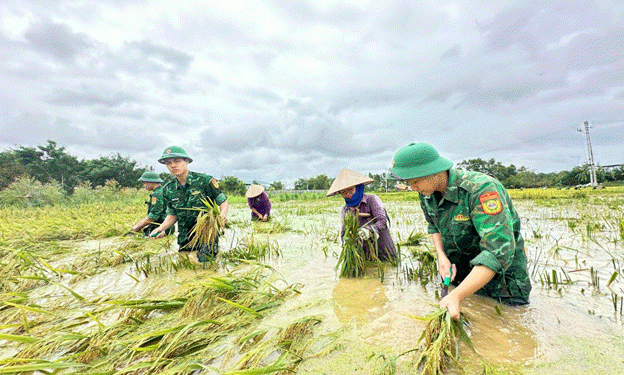In the wake of Cyclone No. 3, which has brought widespread rainfall and elevated river levels, Vĩnh Phúc’s rice farmers are facing significant challenges. The floodwaters have inundated the rice fields in Đồng Tĩnh Commune, Tam Dương District, making it nearly impossible for local farmers to harvest their crops.
Military Intervention and Support
To aid the struggling farmers, the Vĩnh Phúc Border Guard Training Center has mobilized its personnel to assist in the critical task of rice harvesting. According to Colonel Trịnh Hữu Đức, the center’s commander, the troops have been working tirelessly to mitigate the damage caused by the storm. On September 10th alone, 60 soldiers were deployed to the fields, successfully harvesting 2 hectares of rice. Their efforts not only helped to salvage the crops but also provided a significant boost to the morale of the local community.
The soldiers, working under challenging conditions with floodwaters and mud, have become symbols of community support and resilience. Their dedication in the face of adversity has left a lasting impression on the residents, reinforcing the bond between the military and the local population.
Impact and Broader Context
The devastating effects of Cyclone No. 3 are part of a broader trend of increasingly severe weather events affecting agricultural productivity. According to recent data from the Vietnam Meteorological and Hydrological Administration, climate change is contributing to more intense storms and unpredictable rainfall patterns. These changes are placing additional stress on farmers, who must now contend with both immediate and long-term challenges to their livelihoods.
The Vĩnh Phúc response highlights the importance of community and institutional support in managing the impact of such disasters. Effective disaster response not only involves immediate relief efforts but also long-term strategies for building resilience in the face of changing climate conditions.
The coordinated efforts of the Vĩnh Phúc Border Guard Training Center to assist local farmers during the flooding caused by Cyclone No. 3 demonstrate the power of solidarity in times of crisis. Their intervention has not only helped to alleviate immediate damage but also serves as a model for future responses to natural disasters. As climate change continues to pose risks to agricultural stability, such collaborative approaches will be crucial in safeguarding both crops and communities.
Error




